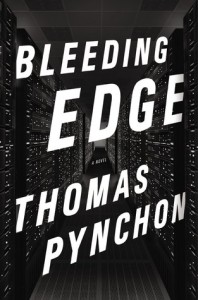I like Thomas Pynchon – which is to say, I like the idea of Thomas Pynchon, more than the actual execution.
My first experience of reading Pynchon was at university, as a first year English lit student. I’d never heard of Pynchon before and The Crying of Lot 49 was required reading for a course on 20th century American literature. It seemed easy enough; it only has 149 pages.
What a deception that was.
Still, I returned to class the next week, exhilarated if only by the fact that Pynchon managed to cram six different plot lines into that slim volume. I think I was the only one.
The Crying of Lot 49 fits perfectly into the decade in which it was written – the 60s – and it’s a good and fairly accessible example of postmodern literature, but it’s also a little dated. So for anyone who wants to get a good feel of what reading a Pynchon book is like without having to subject themselves to the madness that is Gravity’s Rainbow, I wholly recommend Bleeding Edge.
Not because it’s an easy book, because Pynchon books never are, but because it’s more restrained, more sedated. None of the characters have names like Petunia Leeway or Mike Fallopian this time. Perhaps it’s because of the subject matter: the novel starts its narrative on a sunny morning in late August, in 2001, in New York. We all know what’s coming.
The main character of Bleeding Edge, Maxine Tarnow, is an ex-licensed fraud investigator. She’s asked, by a friend, to look into an internet startup, Hashslingrz, and soon discovers their numbers make little sense. From thereon, the plot spirals off into various semi-parallel distances, and if that sounds vague, well, welcome to Pychon’s world. There are desperately unappealing threesomes in burnt-down slop houses, sixties leftover feminists trying to bring down the government one blog post at a time, dubious and pseudotragic agents from shady bureaus, criminals with hearts of gold and criminals with hearts of ice. The city of New York acts as the maze through which Maxine finds herself wandering, full of purpose but without direction. When the attacks of September eleventh occur, as we know they will, they are handled with a solemnity and normalcy not often found in Pynchon’s work, but ultimately they are part of that same maze. When the book ends, there is no resolution: like the universe, the story is neverending, and no matter how hard Maxine looks she will always end up where she started. Life will go on as it has before, and after all the highs and lows it will flatten out as it always does.
It’s an unusually depressing take on life, one that, at first, seems an unlikely one for Pynchon to describe – but then, this is what he always does, except he exercises more restraint here.
Bleeding Edge isn’t particulary rewarding or accessible. The plot gets more and more complicated as more and more characters are added, thrown over the city like a net. Yet I liked Bleeding Edge for the point it makes, and the way it makes it. As a commentary on society, it manages to be both depressing and uplifting at once.
At least, that’s what I took from it, but it’s Thomas Pynchon. So who the hell knows?

